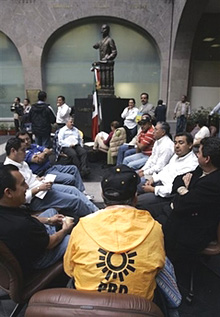
|
 |
 |
 Editorials | Issues | April 2008 Editorials | Issues | April 2008  
Mexico Protests Snag Government's Oil Reform Plans
 Catherine Bremer - Reuters Catherine Bremer - Reuters
go to original


| | Leftist lawmakers, who began fasting to demand that Congress schedule a 4-month national debate on the energy bill, gather at the Senate building in Mexico City, Monday, April 14, 2008. Leftist lawmakers erected makeshift barricades Monday around the podium in Mexico's lower house of Congress, where they have been camped out for more than five days to protest President Felipe Calderon's oil reform proposal. (AP/Miguel Tovar) | | |
Mexico City - Mexican leftists have stormed Congress and taken to the streets in a campaign that could force President Felipe Calderon to dilute his plans to allow foreign companies a bigger role in the oil industry.

Calderon had hoped to rush through a law this month to boost private investment in the oil sector to help Mexico seek new crude reserves in the deep waters of the Gulf of Mexico.

He has the backing of some opposition members in the divided Congress but a backlash of left-wing protests has now delayed a vote until after this month.

Even Calderon's conservative National Action Party, or PAN, admits the bill, which makes it easier for state oil firm Pemex to ally with private firms in the search for oil, will not be voted on before Congress breaks for the summer on April 30.

Leftist lawmakers from the Party of the Democratic Revolution, or PRD, have seized the podiums of both houses of Congress and are even sleeping there to prevent a quick debate and vote on the bill.

"It's clear we'll now have a summer of this," said analyst Dan Lund, head of research firm MUND Americas.

Tens of thousands of protesters gathered in the capital's main square at the weekend in a demonstration against what they see as the "creeping privatization" of the oil sector.

"Even the elite is divided, not just ordinary people. The administration will basically not get its proposal," said Lund, predicting Congress will pass a more watered-down version of the bill later this year.

The energy proposal is Calderon's most ambitious reform attempt since taking office in 2006 but he is taking a big risk by tampering with the cherished state-controlled oil industry, nationalized in 1938 when foreign firms were thrown out.

CAN'T KILL THE BILL

Mexico is the world's No. 5 oil producer and a top U.S. supplier but Pemex says that without foreign partners it cannot reach new reserves fast enough to shore up falling output.

Calderon needs the backing of the centrist Institutional Revolutionary Party, or PRI, to get the 50 percent majority to pass the bill.

PRI leaders say they broadly back plans to give Pemex more autonomy and let it sweeten oil field service contracts with bonus fees.

But analysts say some in the party are wary of being seen to support changes to oil laws so close to mid-term congressional elections in 2009, and the left-wing protests might lure some centrists to the "No" camp.

"The PAN's main challenge is defectors from the PRI," said Francisco Gonzalez, a Latin American studies professor at Johns Hopkins University.

"The left will not be able to derail it, but the public relations dimension is important," he said.

The leftist PRD has been weakened by ideological divisions between moderates and radicals, yet a large group of its lawmakers managed to seize the podiums in the Senate and lower house Chamber of Deputies last week to protest the energy reform plan.

PRD deputies dressed in oil worker suits covered the lower house podium with a banner reading "Closed" and began a round-the-clock vigil, snoozing on benches, playing chess and bedding down for the night in sleeping bags.

The government proposals omit risk-sharing contracts that Pemex had wanted, yet opponents say its "incentive contracts" amount to the same thing and breach a ban in the constitution on private firms drilling for Mexican oil.

"Anyone from a great law expert to a D-grade student would say this is a flagrant violation of the Constitution," an unshaven Sen. Ricardo Monreal said at the Senate sit-in.

Calderon's party and centrists held a short session at another hall in the Senate on Tuesday to sidestep the protests.

Leftist leader Andres Manuel Lopez Obrador, who riled Calderon with months of street protests in 2006 after claiming his presidential election defeat was rigged, has drummed up big crowds to street rallies in recent days.

The government might be helped by a rift in the PRD as moderate and militant camps bicker over an unresolved March 16 party leadership vote.

"The internal struggle for control of the PRD and the failure of its election to redistribute power between moderates and radicals weakens the party's position," said Enrique Bravo at political risk consultancy Eurasia Group.

(Additional reporting by Michael O'Boyle; Editing by Kieran Murray) | 
 | |
 |



